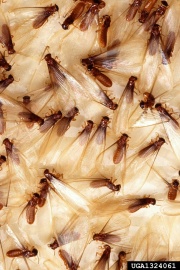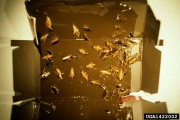Difference between revisions of "Sticky traps"
Jump to navigation
Jump to search
(username removed) |
(username removed) |
||
| Line 2: | Line 2: | ||
== Description == | == Description == | ||
| − | An adhesive strip used to monitor insect infestations. Sticky traps for insects were developed in the 1970s. The strips contain a tacky, non-drying [http://cameo.mfa.org/materials/fullrecord.asp?name=adhesive adhesive] that traps and retains any insects coming into contact. Some strips are housed in boxes or tents. They can also be taped to the floor or hung near a light. Sticky traps are often baited with food or [http://cameo.mfa.org/materials/fullrecord.asp?name=pheromone | + | An adhesive strip used to monitor insect infestations. Sticky traps for insects were developed in the 1970s. The strips contain a tacky, non-drying [http://cameo.mfa.org/materials/fullrecord.asp?name=adhesive adhesive] that traps and retains any insects coming into contact. Some strips are housed in boxes or tents. They can also be taped to the floor or hung near a light. Sticky traps are often baited with food or [http://cameo.mfa.org/materials/fullrecord.asp?name=pheromone%20lures pheromones] to attract the insects. The retained insects can be identified and counted as part of an [http://cameo.mfa.org/materials/fullrecord.asp?name=integrated%20pest%20managment integrated pest managment] program. |
[[File:Germ.cockroach_stickytrap_forestryimages.org.jpg|thumb|Sticky Insect trap]] | [[File:Germ.cockroach_stickytrap_forestryimages.org.jpg|thumb|Sticky Insect trap]] | ||
| Line 11: | Line 11: | ||
== Additional Information == | == Additional Information == | ||
| − | N. Odegaard, "Insect Monitoring in Museums", WAAC Vol 13 (1), Jan. 1991, 19-20. | + | º N. Odegaard, "Insect Monitoring in Museums", WAAC Vol 13 (1), Jan. 1991, 19-20. |
== Authority == | == Authority == | ||
| − | * | + | * External source or communication Comment: Nancy Odegaard, "Insect Monitoring in Museums", WAAC Vol 13 (1), Jan. 1991, 19-20. |
| − | * | + | * Website address 1 Comment: AMOL reCollections Glossary at http://amol.org.au/recollections/7/c/htm |
[[Category:Materials database]] | [[Category:Materials database]] | ||
Revision as of 06:34, 24 July 2013
Description
An adhesive strip used to monitor insect infestations. Sticky traps for insects were developed in the 1970s. The strips contain a tacky, non-drying adhesive that traps and retains any insects coming into contact. Some strips are housed in boxes or tents. They can also be taped to the floor or hung near a light. Sticky traps are often baited with food or pheromones to attract the insects. The retained insects can be identified and counted as part of an integrated pest managment program.
Synonyms and Related Terms
vapor pest strip; insect trap; The Trapper; Mr. Sticky; Zone Monitor; Catchmaster; Yellow Sticky Strips
Additional Information
º N. Odegaard, "Insect Monitoring in Museums", WAAC Vol 13 (1), Jan. 1991, 19-20.
Authority
- External source or communication Comment: Nancy Odegaard, "Insect Monitoring in Museums", WAAC Vol 13 (1), Jan. 1991, 19-20.
- Website address 1 Comment: AMOL reCollections Glossary at http://amol.org.au/recollections/7/c/htm

